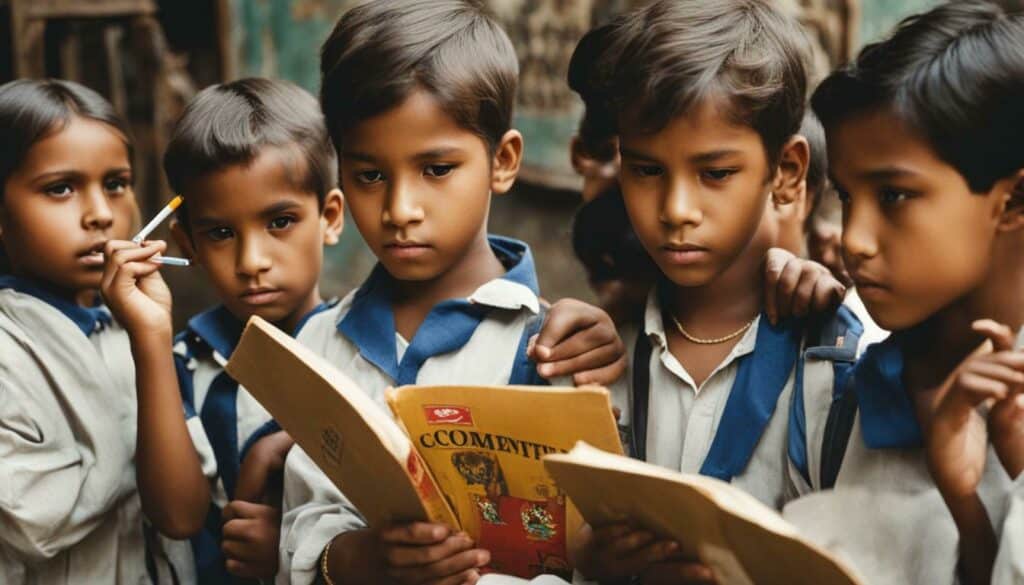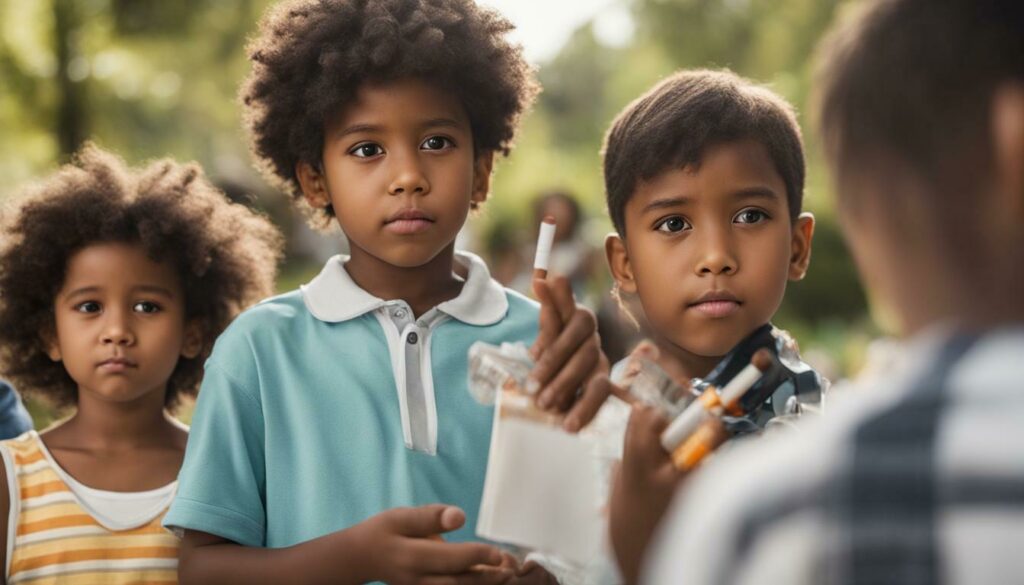Peer pressure can significantly influence children’s behavior and decision-making. Discovering peer pressure solutions is crucial in empowering kids to navigate social influences confidently.
Factual data: Peer pressure can have a significant impact on kids as they strive to fit in with their peers. It can lead to risky behavior such as cheating, shoplifting, drugs, alcohol, and sex. To help kids resist peer pressure, parents can follow several strategies. First, it’s important not to overreact when kids discuss what their friends are doing and to stay calm. Parents can also talk to their kids about what makes a true friend and invite their child’s friends home to evaluate their influence. It’s also important to talk to kids about independence and encourage them to make their own decisions. Role playing and modeling saying “no” can also help kids develop the confidence to resist peer pressure. Finally, parents should limit their child’s exposure to media and monitor what they watch or view on the internet to protect them from negative influences.
Key Takeaways:
- Stay calm and avoid overreacting when kids discuss their friends’ behaviors.
- Talk to your kids about what makes a true friend and the importance of positive peer pressure.
- Invite your child’s friends home to assess their influence and ensure they are positive influences.
- Encourage your kids to think independently and make their own decisions.
- Practice role playing and teach your kids how to say “no” confidently.
Understanding the Effects of Peer Pressure on Kids
Peer pressure can lead kids to engage in risky behaviors, such as cheating, shoplifting, and substance abuse. Understanding the effects of peer pressure is essential for parents to support their children effectively.
According to a study conducted by the National Institute on Drug Abuse, adolescents who experience peer pressure are more likely to start using drugs. This highlights the powerful influence that peers can have on children’s decision-making processes. It is crucial for parents to recognize the potential risks associated with peer pressure and take proactive steps to address them.
To protect their children from the negative effects of peer pressure, parents can establish open lines of communication. Encourage your child to talk about their experiences and feelings without judgment. By actively listening to your child and offering guidance, you can help them navigate challenging situations.
Furthermore, it is important to educate children about the characteristics of a true friend. Teach them that a true friend encourages positive behavior, respects boundaries, and supports their individuality. By fostering healthy friendships, children are more likely to resist negative peer pressure.
| Positive Effects | Negative Effects |
|---|---|
| Encourages personal growth | Leads to risky behaviors |
| Promotes confidence and self-esteem | Creates feelings of insecurity and self-doubt |
| Provides a sense of belonging | Pushes children to conform to unhealthy norms |
“Good friends help you to find important things when you have lost them…your smile, your hope, and your courage.” – Doe Zantamata
By instilling independence in children, parents can empower them to make their own decisions. Encourage your child to think critically and evaluate the consequences of their actions. By developing autonomy, they can resist peer pressure with confidence.
Remember to engage in role-playing activities with your child and practice saying “no” in various scenarios. This helps them build resilience and assertiveness, equipping them with the necessary skills to resist negative peer pressure.
Key Takeaways
- Peer pressure can lead kids to engage in risky behaviors, such as cheating, shoplifting, and substance abuse.
- Understanding the effects of peer pressure is crucial for parents to effectively support their children.
- Open communication, teaching about true friendships, promoting independence, and role-playing are effective strategies for handling peer pressure.
By implementing these strategies and limiting media exposure to negative influences, parents can nurture resilience in their children and help them overcome the challenges posed by peer pressure.

Helping children distinguish between healthy and unhealthy friendships can provide them with a solid foundation to resist negative peer pressure and embrace positive influences. By fostering an understanding of what makes a true friend, parents can empower their children to make informed decisions about the relationships they cultivate.
One important aspect of a true friend is someone who supports and encourages their peers in a positive way. True friends uplift each other and promote personal growth, rather than pressuring others into engaging in harmful behaviors. By highlighting the qualities of a supportive friend, parents can help children identify those who will have a positive influence on their lives.

It is also essential to teach children the importance of mutual respect and trust in friendships. A true friend values and respects their peers’ opinions, boundaries, and individuality. By nurturing relationships built on trust and respect, children are more likely to withstand negative peer pressure and make choices aligned with their own values and beliefs.
Table: Qualities of a True Friend
| Qualities | Description |
|---|---|
| Loyalty | A true friend stands by you through thick and thin. |
| Supportive | A true friend uplifts and encourages you to be the best version of yourself. |
| Respectful | A true friend values your opinions, boundaries, and individuality. |
| Trustworthy | A true friend can be relied upon and keeps your confidences. |
By cultivating an understanding of what constitutes a true friend, children can surround themselves with positive influences and resist negative peer pressure. Encouraging open conversations about friendships and sharing personal experiences can further strengthen their ability to navigate social situations with confidence and make choices that align with their values.
Evaluating Influence: Inviting Friends into Your Home
By inviting their child’s friends into their home and observing their interactions, parents can evaluate whether these friendships have a positive or negative impact on their child’s choices. These interactions can provide valuable insights into the dynamics of the friendship and help parents determine if their child’s friends are encouraging positive behaviors or influencing them to engage in risky activities.
During these visits, parents can pay attention to how their child and their friends interact. Are they respectful and supportive of each other? Do they engage in activities that promote healthy development, such as participating in hobbies, engaging in intellectual conversations, or working together on creative projects?
On the other hand, parents should also be alert to any signs of negative influence. Are the conversations centered around risky behaviors, gossip, or negative attitudes? Do they pressure their child into doing things they are uncomfortable with or that go against their values?
| Positive Signs | Negative Signs |
|---|---|
| Respectful and supportive interactions | Engaging in risky behaviors or encouraging negative attitudes |
| Participating in hobbies or engaging in intellectual conversations | Pressuring the child into activities that go against their values |
| Working together on creative projects | Centering conversations around gossip or negativity |
By thoroughly evaluating the influence of their child’s friends, parents can make informed decisions about the strength and impact of these friendships. They can support and encourage their child to spend more time with positive influencers while addressing any concerns they may have about negative influences. Ultimately, this proactive approach can help children navigate through peer pressure and make choices that are aligned with their own values and beliefs.

Encouraging Independence: Making Your Own Decisions
Empowering children with the skills to think critically and make independent choices is key in equipping them to handle and prevent peer pressure effectively. As parents, it’s important to have open conversations with your kids about the value of independence and decision-making.
One strategy to encourage independence is to involve your child in decision-making processes. This allows them to develop a sense of ownership and responsibility for their choices. Start by giving them age-appropriate decision-making opportunities, such as allowing them to choose their own extracurricular activities or decide how they want to spend their free time.

Another helpful approach is role playing. Role-playing scenarios where your child can practice saying “no” in different peer pressure situations can greatly boost their confidence. By acting out different scenarios, they can develop effective strategies to resist negative influences and make choices aligned with their values and beliefs.
Remember, it’s essential to cultivate a supportive and non-judgmental environment at home. Encourage open communication and actively listen to your child’s concerns and experiences. By fostering a strong parent-child bond, your child will be more likely to seek guidance and share their struggles, making it easier for you to provide advice and support.
To summarize, promoting independence and decision-making skills is crucial in helping children navigate peer pressure. Involving them in decision-making processes, role playing, and fostering open communication can empower them to make confident choices and resist negative influences.
Role Playing and Saying “No”: Developing Confidence
Through role playing exercises and practicing assertive responses, children can build the confidence necessary to resist peer pressure and make choices aligned with their values. Role playing allows children to explore different scenarios and practice effective ways to respond when faced with pressure from their peers. By taking on different roles and experimenting with various strategies, kids can develop the skills needed to assertively say “no” and stand up for themselves.
When engaging in role playing, parents can guide their children by portraying different characters, such as a persuasive friend or a peer who is pressuring them to engage in negative behavior. This activity helps children understand the tactics used by their peers and empowers them to respond in a positive manner. By rehearsing their responses, kids become more comfortable and confident in their ability to resist peer pressure.
In addition to role playing, parents can also encourage their children to use assertive statements when faced with peer pressure. Teaching kids phrases such as “I don’t feel comfortable doing that” or “That’s not something I believe in” can empower them to express their own opinions and boundaries. By practicing assertive responses, children learn that they have the right to make their own decisions and that it’s okay to say “no” when something doesn’t align with their values.

Developing confidence to resist peer pressure is crucial for children as they navigate their social environments. By incorporating role playing exercises and practicing assertive responses, parents can provide their kids with the tools they need to make independent choices and stand up for themselves. Remember, fostering resilience and confidence in children is an ongoing process, so regular communication and support from parents are essential in helping them overcome peer pressure.
Limiting Media Exposure: Protecting from Negative Influences
Parents play a crucial role in safeguarding their children from negative media influences by monitoring what they watch and view on the internet. With the prevalence of smartphones, tablets, and computers, kids now have easy access to a wide range of media content. It’s essential for parents to be proactive in setting boundaries and guiding their children’s media consumption.
Creating a media plan can be an effective strategy for peer pressure prevention. Sit down with your child and establish a set of guidelines regarding screen time and the types of content they can access. Explain why certain media may not be suitable for their age or development, emphasizing the potential negative influence it can have on their behavior and decision-making.

In addition to setting limits, engaging in open communication is crucial. Regularly discuss the media your child is consuming and ask questions about the content they find interesting. Encourage critical thinking by helping them analyze and evaluate the messages portrayed in movies, TV shows, and online platforms. By discussing media with your child, you can impart valuable lessons about peer pressure prevention and help them develop media literacy skills.
Table: Positive Media Alternatives
| Media Category | Positive Alternatives |
|---|---|
| Television Shows | Educational programs, documentaries, and age-appropriate content |
| Movies | Family-friendly films with positive messages |
| Online Content | Verified educational websites, interactive learning platforms, and creative outlets |
| Video Games | Games that promote problem-solving, teamwork, and critical thinking |
By actively monitoring and curating your child’s media consumption, you can minimize their exposure to negative influences and enhance their overall well-being. Remember, your involvement as a parent is essential in shaping their media habits and helping them navigate the complexities of peer pressure.
Wrapping Up: Nurturing Resilience in the Face of Peer Pressure
Equipping children with the skills to navigate peer pressure is a continuous process that involves fostering resilience, open communication, and providing ongoing support. As parents, it is important to understand the potential risks and negative consequences of peer pressure on kids. By staying calm and not overreacting when children discuss their friends’ activities, we create an environment where they feel comfortable sharing their experiences.
One effective strategy is to talk to kids about what makes a true friend. By discussing the qualities of healthy friendships and encouraging positive peer pressure, we empower children to make informed choices. Inviting their friends home and observing their behavior can help us assess their influence and provide guidance if necessary.
Encouraging independence is another crucial aspect. By teaching children the importance of making their own decisions, we instill confidence that allows them to resist negative peer pressure. Role playing scenarios and practicing saying “no” in different situations can help develop their confidence and assertiveness.
In today’s digital age, monitoring our children’s media exposure is paramount. By limiting their access to negative influences, we can safeguard them from potential peer pressure triggers. Open and honest conversations about the content they consume and setting clear boundaries can protect them from harmful influences.
By implementing these strategies and maintaining open lines of communication, we can nurture resilience in our children. It is essential to remember that overcoming peer pressure is a journey, and our continuous support will help them navigate these challenges successfully.
FAQ
Q: How can parents help their kids resist peer pressure?
A: Parents can follow several strategies to help their kids resist peer pressure. These include staying calm and not overreacting when kids discuss what their friends are doing, talking to their kids about what makes a true friend, inviting their child’s friends home to evaluate their influence, talking to kids about independence and encouraging them to make their own decisions, role playing and modeling saying “no,” and limiting their child’s exposure to media and monitoring what they watch or view on the internet to protect them from negative influences.
Q: What are the potential risks of peer pressure on kids?
A: Peer pressure can have a significant impact on kids and lead to risky behavior such as cheating, shoplifting, drugs, alcohol, and sex. It can also affect their self-esteem and cause them to feel pressured to fit in or conform to their peers’ expectations.
Q: How can parents evaluate the influence of their child’s friends?
A: Parents can evaluate the influence of their child’s friends by inviting them home and observing their behavior. This allows parents to get a better understanding of who their child is spending time with and how they may be influencing their child’s behavior.
Q: Why is it important for children to make their own decisions?
A: Encouraging children to make their own decisions helps them develop independence and confidence. It allows them to think critically and make choices that align with their values, rather than succumbing to negative peer pressure.
Q: How can role playing and saying “no” help kids resist peer pressure?
A: Role playing scenarios and practicing saying “no” can help kids develop the confidence to resist peer pressure. By rehearsing different situations, they can learn how to assertively say “no” and stand up for themselves when faced with negative influences.
Q: Why is limiting media exposure important in protecting kids from negative influences?
A: Limiting media exposure is important in protecting kids from negative influences because media can often portray behaviors that are not appropriate or healthy. By monitoring what kids watch or view on the internet, parents can ensure they are not being exposed to content that may encourage negative peer pressure.
Q: How can parents nurture resilience in children to handle and overcome peer pressure?
A: Parents can nurture resilience in children by providing support, fostering open communication, teaching problem-solving skills, and building their self-esteem. By equipping children with these qualities, they will be better prepared to handle and overcome peer pressure.